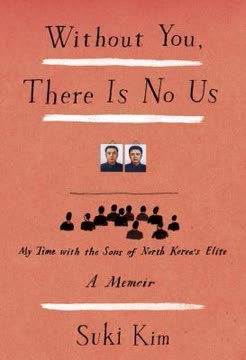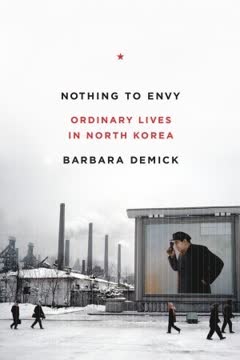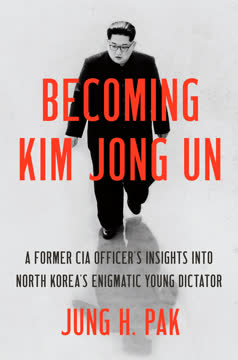Key Takeaways
1. A Writer's Obsession with the Hermit Kingdom
Over the next nine years, with each implausible crossing of its immutable border, I became further intoxicated by this unknown and unknowable place.
Personal quest. Suki Kim, a Korean-American writer, found herself drawn to North Korea not just for journalistic interest but due to a deep personal connection to the divided peninsula. Her family's history, marked by the Korean War and the abduction of relatives, fueled an "obsession" to understand the isolated nation. This quest for understanding was rooted in a desire to "put the fragments back together" of a nation tragically split.
Forbidden allure. Her initial visit in 2002, amidst George W. Bush's "axis of evil" declaration, offered a glimpse into a country operating on its own "Juche Year 100" calendar, entirely cut off from the global information age. This isolation, coupled with the regime's iron grip and the suffering of its people—millions dead from famine, 120,000 political prisoners in gulags—only intensified her fascination. The difficulty of entry and the strict control over what foreigners could see made it an irresistible, yet troubling, subject.
Seeking home. Having immigrated to America at thirteen and feeling perpetually rootless, Kim found an unexpected sense of "home" in Pyongyang during her first visit. This feeling of recognition, of shared longing and loss, resonated with her own experience of displacement. She identified with the "generations of Koreans separated by division," believing that understanding North Korea might help her understand her own fragmented identity.
2. PUST: A Gilded Cage for North Korea's Elite
Locked in that prison disguised as a campus in an empty Pyongyang suburb, heavily guarded around the clock, all we had was one another.
A unique institution. Pyongyang University of Science and Technology (PUST) was an improbable international university, funded by evangelical Christians worldwide, where foreign missionaries taught English to the sons of North Korea's elite. The campus, described as a "sanitarium" or "five-star prison," was isolated and heavily guarded, with buildings connected by enclosed walkways, ensuring constant visibility and lack of privacy.
Elite students. The 270 male students, mostly in their late teens and early twenties, were the "crème de la crème" of DPRK society, many having transferred from top universities like Kim Il-sung University. They were being groomed for top positions, and their presence at PUST, while other universities were reportedly shut down for construction work, suggested a strategic move by the regime to shield and educate its future leaders.
Missionary teachers. The thirty foreign teachers, half Caucasian and half of Korean origin, were unpaid missionaries, individually funded by their churches. Their mission was to subtly spread Christianity, but their immediate role was to arm these young men with English, the language of the "enemy," creating an inherent contradiction in the school's purpose.
3. Life Under Pervasive Surveillance and Control
Living in Pyongyang is like living in a fishbowl. Everything you say and do will be watched.
Constant monitoring. Both teachers and students lived under relentless surveillance. Teachers' emails were monitored, their movements restricted to campus or pre-approved, minder-escorted outings, and their conversations were assumed to be recorded. Students, too, were constantly watched, with "monitors" in each class and dormitory reporting on their peers.
Strict rules and censorship. An extensive list of rules dictated everything from dress code (no jeans) and conversation topics (no politics, personal issues, or outside world) to media consumption (no foreign books/magazines, only state-approved TV). Even religious practice for missionaries was permitted only if kept from students and conducted discreetly. This environment fostered self-censorship and paranoia.
Infantilizing control. The regime's control extended to every aspect of life, making individual choice almost nonexistent. Students' careers, college placements, and even daily schedules (including mandatory "nap time" and gardening duty) were dictated. This constant subjugation and the need to ask permission for everything created a sense of helplessness, mirroring the broader societal control.
4. The Students: Naivety, Obedience, and Hidden Longings
They were young, and I remember them as beautiful, although on this point I cannot be certain as I soon began to delight in looking at them like they were my children, and can no longer recall a time when I didn’t.
Eager and obedient. The students were exceptionally polite, eager to learn English, and diligently followed instructions, often rising in unison and demanding more homework. Their initial questions were simple and innocent, reflecting a sheltered upbringing and a profound lack of general knowledge about the outside world.
Ingrained misinformation. Despite their intelligence, they displayed astonishing naivety, believing that:
- Juche Tower was the tallest in the world.
- Their Arch of Triumph was higher than Paris'.
- Everyone in the world spoke Korean.
- Blue jeans were originally made for miners.
- Kimchi was the most famous food in the world.
This misinformation, coupled with their inability to differentiate between truth and lies, was a product of lifelong indoctrination.
Hidden humanity. Beneath the layers of propaganda and conditioned responses, the students revealed moments of genuine human emotion and longing. Their heartfelt letters to mothers and friends, their excitement over a simple game win, their shy curiosity about girls, and their occasional admissions of homesickness or frustration hinted at a suppressed individuality. Their "buddy system," while enforced, also showed deep loyalty and care.
5. Propaganda's Pervasive Grip on Truth
It was at moments like these that I could not help but think that they—my beloved students—were insane.
Cult of personality. The entire nation revolved around the "Great Leader" narrative, with Kim Il-sung and Kim Jong-il deified. Every building, TV screen, song, and monument heralded their "miraculous achievements." Even the calendar counted time from Kim Il-sung's birth, and every citizen wore a pin with his image.
Twisted history and lies. The regime systematically distorted facts, from claiming victory in the Korean War to fabricating historical events like Dangun's remains being excavated by Kim Il-sung. This constant stream of misinformation made it impossible for students to discern truth, leading to a "belligerent isolation" where any external information was viewed with suspicion or dismissed as lies.
Language of control. The Korean language itself was bastardized with curses against enemies and militaristic terms for everyday life (e.g., "battlefield" for workplace, "platoon leader" for monitor). This linguistic control reinforced the narrative of constant threat and the need for unwavering loyalty, making critical thinking antithetical to their system.
6. The Stark Reality Beyond Pyongyang's Facade
It was clear to me that there was one set of people in Pyongyang—among them my students, the party leaders, the minders—who were well fed and had healthy complexions and were of regular height, and then there were all the other people, the ones I glimpsed through the windows of the bus.
Two Koreas within North Korea. The author observed a stark division between the privileged elite, including her students, who were well-fed and healthy, and the vast majority of the population. Outside Pyongyang, she saw "skeletal" people with "ghastly" faces, tattered clothing, and "hollowed eyes," resembling "Nazi concentration camp victims," engaged in forced labor.
A land of scarcity. Despite propaganda about a "powerful and prosperous nation," the country suffered from severe shortages. Food was bland and scarce, electricity was spotty, and basic amenities were lacking. Even the elite students' families faced challenges, like carrying water for kimjang due to lack of running water.
The "slaves and soldiers." The pervasive poverty and forced labor outside the capital painted a grim picture of a nation where most citizens were effectively "slaves" to the regime. The students, though privileged, were also "soldiers," marching in formation, singing war songs, and performing guard duties in freezing temperatures, their lives regimented like those in barracks.
7. The Ethical Burden of Witnessing and Teaching
Was this really conscionable? Awakening my students to what was not in the regime’s program could mean death for them and those they loved.
A moral tightrope. The author faced a profound ethical dilemma: how much truth to reveal to her students without endangering them. Sharing information about the outside world, even subtly, could lead to severe consequences for the students if they questioned the regime. This internal conflict made her question her purpose and the impact of her presence.
Missionary conflicts. The evangelical Christian teachers, while driven by a desire to spread the gospel, also grappled with the regime's strict rules against proselytizing. Their belief in a "temporary" earthly suffering leading to eternal salvation clashed with the author's view of the immediate, brutal reality of North Korean lives, leading to heated arguments and a "chasm" of understanding.
The cost of connection. Forming genuine bonds with the students, seeing their vulnerability and potential, intensified the author's anguish. The realization that her efforts to "open up one path of understanding" could lead to their demise, rather than liberation, was a heavy burden. She questioned if awakening them to a different reality would make them happier or simply lead to their suffering.
8. The Illusion of Choice and Freedom
The notion of following your heart’s desire, of going wherever you chose, did not exist here, and I did not see any way to let them know what it felt like, especially since, after so little time in their system, I had lost my own sense of freedom.
Restricted movement and information. Students had no freedom of movement, even within Pyongyang, and their access to information was severely limited to state-approved content. Concepts like "Internet," "credit cards," "exchange programs," or even "different TV channels" were either unknown or incomprehensible, highlighting their profound isolation.
Predetermined lives. From college placement to careers, every major life decision for the students was made by the government, based on grades, loyalty, and family background (songbun). The idea of a "dream job" or "applying" for a position was alien, as was the concept of individual choice in marriage or personal pursuits.
Erosion of personal freedom. The constant surveillance and the need for obedience gradually eroded the teachers' own sense of freedom. The author noted how quickly she adapted to the rules, feeling like a "prisoner" and losing her "own sense of freedom," making it difficult to convey the concept of true liberty to her students.
9. Human Connection Across an Unbridgeable Divide
I could not say, as I shook hands with each of them, Leave this wretched place. Leave your wretched Great Leader. Leave it, or shake it all up. Please do something.
Fleeting moments of normalcy. Despite the oppressive environment, genuine human connections formed. Teachers and students shared meals, played sports, and exchanged jokes, creating "fleeting moments of connection" that felt almost normal. The students' admiration for their teachers, their shyness, and their shared laughter were heartwarming.
The language of silence. When open communication was impossible, silence became a powerful form of expression. The students' "stone-faced" reactions to propaganda, their "cringing" at the sight of teachers after anti-American speeches, and their unspoken longing for the outside world were interpreted by the author as a silent dialogue.
Unbridgeable chasm. Ultimately, the author realized the "wall between us was impossible to break down, and not only that, it was permanent." The ingrained system of lies, the fear, and the profound conditioning meant that even deep personal connections could not overcome the fundamental divide. The goodbye, with students waving from behind glass, symbolized this unbridgeable separation.
10. The Unseen Forces of Change and Lingering Fear
I do not want to imagine what might happen if they retained my lessons, remembered me, began questioning the system.
Imminent political shift. The context of Kim Jong-il's failing health and Kim Jong-un's impending succession loomed over the semester. The closing of other universities and the special status of PUST for the elite's sons suggested a strategic move by the regime to consolidate power and manage the transition.
Seeds of doubt. Despite the students' conditioned responses, the exposure to foreign teachers and glimpses of the outside world planted "scraps of new information" that lingered. Questions about the Internet, the meaning of "democracy," and the inconsistencies in their own narratives hinted at a nascent curiosity and critical thinking.
A mother's fear. The author's deepest fear was not for herself, but for her students. She hoped they would forget her lessons and remain "soldiers of the regime," rather than questioning the system and facing the "unimaginable consequences" of dissent, such as ending up in gulags. This profound, lingering fear underscored the tragic reality of their lives.
Last updated:
Review Summary
Without You, There Is No Us offers a unique glimpse into North Korea's elite through the author's experience teaching English at a prestigious university. Readers praised Kim's bravery, intelligence, and emotional storytelling, though some found her personal reflections distracting. The book provides valuable insights into the isolated society, its brainwashed youth, and the psychological toll of constant surveillance. While controversial for its undercover nature, many considered it an important contribution to understanding North Korea, though some criticized Kim's portrayal of her Christian colleagues.
Similar Books
Download PDF
Download EPUB
.epub digital book format is ideal for reading ebooks on phones, tablets, and e-readers.







